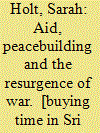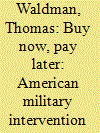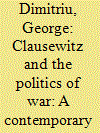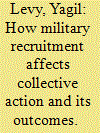|
|
|
Sort Order |
|
|
|
Items / Page
|
|
|
|
|
|
|
| Srl | Item |
| 1 |
ID:
108742


|
|
|
|
|
| Publication |
Hampshire, Palgrave Macmillan, 2011.
|
| Description |
xviii, 222p.
|
| Standard Number |
9780230240278
|
|
|
|
|
|
|
|
|
|
|
|
Copies: C:1/I:0,R:0,Q:0
Circulation
| Accession# | Call# | Current Location | Status | Policy | Location |
| 056386 | 954.9303/HOL 056386 | Main | On Shelf | General | |
|
|
|
|
| 2 |
ID:
166592


|
|
|
|
|
| Summary/Abstract |
This paper explores the notion that US efforts to evade the political costs of war paradoxically contribute to the subsequent exacerbation of costs over time. Leaders seek to purchase political capital in the short term by limiting the costs and requirements of military operations, but in doing so cause strategic and political liabilities to mount in the long run. While identification of such behaviour is not new, insufficient attention has been devoted to explaining its causes, dynamics, and manifestations in relation to key decisions on and in war. Evidence derived from studies of recent American discretionary campaigns is analysed to advance an argument with respect to this pattern of self-defeating strategic behaviour.
|
|
|
|
|
|
|
|
|
|
|
|
|
|
|
|
| 3 |
ID:
173420


|
|
|
|
|
| Summary/Abstract |
This paper re-examines the theoretical underpinnings of Strategic Studies, proposing a novel theory and a new framework for analysing war’s fundamental relationship with politics in line with the Clausewitzian tradition. Throughout modern history, Clausewitz’s concept of politics has been misconstrued as referring only to policy whereas in fact, for him, ‘politics’ was a much broader concept, including domestic power struggles. The political logic of war is defined here as the convergence of the interrelating factors of power struggles and policy objectives within a given polity that restrains and enables these political forces. The analysis of the Clausewitzian political logic of war is conducted through the sociological ‘liquid modern’ lens. It is argued that with power increasingly shifting from centralised state-oriented political leadership towards market forces, non-state actors and other political bodies, the effectiveness of war has been reduced. This is evident in the fragmentation of Western political systems and, as a result, suboptimal strategy and the domination of domestic power struggles in political decision-making concerning war.
|
|
|
|
|
|
|
|
|
|
|
|
|
|
|
|
| 4 |
ID:
119637


|
|
|
|
|
| Publication |
2013.
|
| Summary/Abstract |
This paper aims to advance the research on the conjunction of two fields-antiwar protest and casualty aversion-by offering a conceptual development of the role of military recruitment in affecting casualty sensitivity-incited antiwar mobilization. Scholars have shown that sensitivity to losses is not a constant variable. Its reflection in the public sphere is affected by variables clustered together as "the politics of war," such as sense of threat, mission success, number of casualties, and elite consensus, which can be mediated by collective actors. However, the role of the mode of military recruitment in influencing collective action in the military realm has been neglected. It is argued that the mode of military recruitment mediates collective actors' ability to leverage the politics of war to challenge dominant discourse and influence war policy, owing to the cumulative impact of four recruitment-related variables: republicanism, social power, the favoring of "voice," and bounded discourse. All shape the movement's framing and resources in a way that affects mobilization.
|
|
|
|
|
|
|
|
|
|
|
|
|
|
|
|
|
|
|
|
|